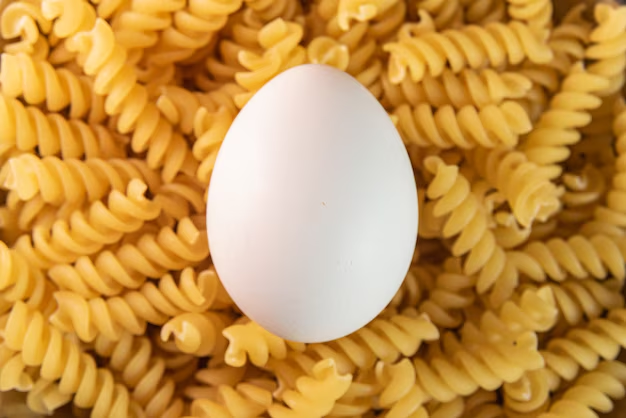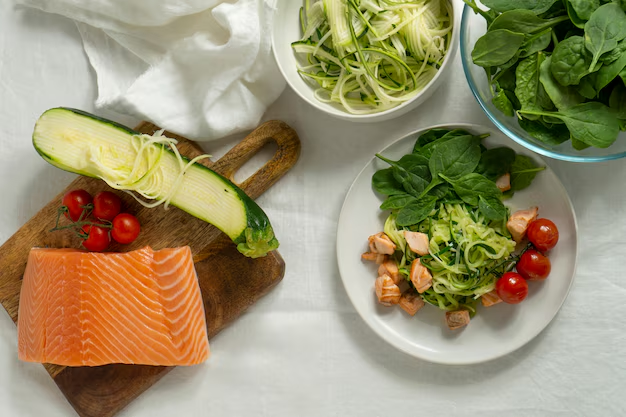Eggs are a staple in many households and a beloved food across the United States. Known for their versatility and nutritional benefits, they fit seamlessly into a variety of diets. Packed with high-quality protein and loaded with essential vitamins and minerals, eggs are a powerhouse of nutrition. But what about carbs? Do eggs have carbs? This is a common question, especially among those on low-carb diets. Fortunately, eggs are naturally low in carbohydrates, making them a perfect choice for ketogenic and other carb-conscious eating plans.
Do Eggs Have Carbs?
Eggs are widely celebrated for being nutrient-dense and low in carbohydrates. Are eggs high in carbs? The short answer is no. In fact, eggs are one of the lowest-carb foods you can consume. A single large egg contains only trace amounts of carbohydrates—making it ideal for anyone looking to minimize their carb intake. This low-carb profile is one reason eggs have become a staple in diets such as keto, Atkins, and paleo.
How Many Carbs Are in an Egg?
When it comes to carb content, eggs are remarkably consistent. A large egg contains about 0.6 grams of carbohydrates. This amount is so minimal that it’s nearly negligible in most diets. For those counting carbs closely, this is great news.
How Many Net Carbs in 2 Eggs?
Eating two eggs doubles the carb count, but the total remains impressively low at approximately 1.2 grams of carbohydrates. This means you can enjoy a filling, nutritious breakfast without worrying about exceeding your daily carb limit. Whether you prefer boiled, poached, or fried eggs, the carb content stays the same—as long as you skip carb-heavy additions like bread or sugary condiments.
Carbs in Egg Whites vs. Whole Eggs
Egg whites and whole eggs differ slightly in their nutritional content, especially when it comes to carbs. Both parts of the egg are excellent sources of nutrition, but their roles in a low-carb diet vary.
- Egg Whites: The white portion of an egg contains almost no carbohydrates—less than 0.1 grams per large egg. This makes egg whites a popular choice for those looking to reduce calorie and carb intake while still getting a solid protein boost.
- Egg Yolks: The yolk, on the other hand, contains most of the trace carbs found in an egg, about 0.5 grams. Despite this, yolks are also rich in essential nutrients like choline and healthy fats, making them a valuable part of a balanced diet.
Whether you consume just the whites or the entire egg, the carbohydrate impact remains minimal, making both options excellent for low-carb lifestyles.
Do Scrambled Eggs Have Carbs?
Scrambled eggs are a breakfast favorite, but do they have carbs? The answer depends largely on how they are prepared. Plain scrambled eggs, made with just eggs and a little butter or oil, are very low in carbs—usually less than 1 gram per serving.
However, the carb count can increase if you add ingredients like:
- Milk: Adds about 1-2 grams of carbs per tablespoon.
- Cheese: Depending on the type, cheese can contribute 0-1 gram of carbs per slice or ounce.
- Vegetables: While healthy, certain vegetables like onions or peppers may slightly raise the carb content.
How Eggs Fit Into a Low-Carb Diet

Nutritional Profile of Eggs
Eggs are a nutritional marvel. A single large egg contains about:
- Calories: 70
- Protein: 6 grams
- Fat: 5 grams (including healthy fats).
- Carbohydrates: Less than 1 gram.
This makes them a fantastic choice for low-carb diets, offering substantial protein without pushing your carb limit.
Why Eggs Are Ideal for Low-Carb Diets
Eggs aren’t just low in carbs—they’re incredibly filling and packed with nutrients. Here’s why they shine:
- Minimal Carbs: With less than 1 gram of carbs per egg, you can enjoy them without worrying about exceeding your carb allowance.
- Protein Powerhouse: High-quality protein in eggs keeps you full longer, helping control appetite and reduce unnecessary snacking.
- Versatile and Easy to Cook: Eggs can be incorporated into nearly every meal, from breakfast omelets to dinner casseroles.
- Rich in Nutrients: Eggs are loaded with vitamin D, choline, and antioxidants like lutein and zeaxanthin, which support brain and eye health.
Examples of Keto-Friendly Egg Recipes
Here are some delicious ways to include eggs in your low-carb menu:
- Scrambled Eggs with Cheese and Spinach: Whisk eggs with cream, sauté some spinach, and stir in shredded cheese for a creamy breakfast.
- Egg Muffins with Bacon and Vegetables: Line a muffin tin with bacon slices, add beaten eggs, and toss in chopped bell peppers or mushrooms. Bake for a portable, protein-packed snack.
- Avocado and Egg Salad: Combine boiled eggs with mashed avocado, lime juice, and salt for a creamy, low-carb spread or salad.
Eggs’ Health Effects
Health Benefits of Eggs
Eggs offer several health advantages:
- Brain Health: Eggs are one of the best dietary sources of choline, essential for brain development and nerve function.
- Eye Health: The antioxidants lutein and zeaxanthin help protect against age-related eye conditions like macular degeneration.
- Heart Health: Despite old concerns about cholesterol, recent studies suggest that moderate egg consumption does not increase heart disease risk for most people.
Potential Risks of Eating Eggs
While eggs are nutritious, it’s essential to eat them in moderation:
- Cholesterol Content: One egg contains about 186 mg of cholesterol. For those with specific health conditions, consult a healthcare professional about your egg intake.
- Balanced Diet: Eggs should be part of a varied diet, complemented with vegetables, lean proteins, and healthy fats.
Which Foods Have No Carbs?
When following a low-carb or keto diet, knowing which foods contain zero carbohydrates can be a game-changer. These foods allow you to stay within your daily carb limits while still enjoying a wide variety of flavors and nutrients. Let’s explore foods that naturally have no carbs and why they’re essential for low-carb diets.

1. Meat
Meat is a primary source of zero-carb protein. It contains no carbohydrates because it’s made entirely of protein and fat. Some excellent no-carb meat options include:
- Beef: Steaks, ground beef, and roasts.
- Chicken: Skinless or skin-on chicken breasts, thighs, and wings.
- Pork: Pork chops, tenderloin, and bacon (check for added sugars in processed varieties).
- Lamb: Lamb chops, ground lamb, and leg of lamb.
These meats are nutrient-dense, providing essential amino acids, iron, and B vitamins. When choosing meat, opt for unprocessed cuts to avoid hidden sugars or starches.
2. Fish and Seafood
Fish and most seafood are also naturally carb-free, making them ideal for low-carb diets. They’re rich in protein and omega-3 fatty acids, which are beneficial for heart and brain health. Some excellent choices include:
- Fatty Fish: Salmon, mackerel, sardines, and trout.
- White Fish: Cod, haddock, and tilapia.
- Shellfish: Shrimp, crab, lobster, and scallops.
Fish is an excellent addition to a low-carb diet because it’s not only carb-free but also loaded with nutrients like iodine, selenium, and vitamin D.
3. Fats and Oils
Pure fats and oils are free from carbohydrates. They are essential for adding flavor, improving satiety, and increasing calorie intake on low-carb diets. Examples of zero-carb fats include:
- Oils: Olive oil, avocado oil, coconut oil, and sesame oil.
- Animal Fats: Butter, ghee, lard, and tallow.
Choose high-quality, unrefined oils for cooking and drizzling over dishes. They also pair well with vegetables and protein-rich foods to boost the nutritional value of meals.
4. Eggs
While eggs are low-carb rather than zero-carb (less than 1 gram of carbs per egg), they are a fantastic choice for low-carb diets. Eggs are rich in protein, healthy fats, and important nutrients like choline, which supports brain health. Hard-boiled eggs, omelets, or fried eggs are all versatile options that can complement carb-free foods.
5. Dairy (Some Types)
While many dairy products contain carbs due to their natural lactose content, some types of dairy have negligible or zero carbs. Examples include:
- Cheese: Hard and aged cheeses like cheddar, parmesan, and gouda.
- Cream: Heavy cream and whipping cream have minimal carbs.
- Butter: Pure butter is carb-free and rich in fat.
Be mindful of serving sizes and check labels, especially for processed dairy products, to ensure they’re free from added sugars.
6. Non-Starchy Beverages
Beverages can also be carb-free if you know what to choose. Options include:
- Water: Sparkling, still, or flavored (unsweetened).
- Tea and Coffee: Unsweetened black coffee or herbal teas.
- Broth: Bone broth or stock can be a savory zero-carb option.
Avoid sweeteners or creamers that can add carbs unless they’re specifically low-carb alternatives.
7. Zero-Carb Seasonings and Condiments
Many seasonings and condiments can add flavor without increasing carb intake. Examples include:
- Salt and Pepper: Essential for seasoning your dishes.
- Herbs and Spices: Basil, oregano, thyme, rosemary, and paprika.
- Vinegars: Apple cider vinegar and white vinegar.
Always read labels for pre-mixed seasoning blends to avoid hidden sugars or starches.
Why Zero-Carb Foods Are Important
Foods with no carbs are crucial for:
- Keto and Low-Carb Diets: They allow you to hit your daily macro goals without exceeding carb limits.
- Blood Sugar Control: These foods won’t spike blood sugar, making them ideal for people with diabetes or insulin resistance.
- Nutritional Flexibility: They provide variety and balance when paired with low-carb vegetables and other healthy foods.
FAQs
Is 3 Eggs a Day Too Much?
Eating three eggs daily is generally safe for healthy individuals. Eggs are nutrient-dense and filling, but consuming them in moderation is key. If you have cholesterol concerns, consult your doctor for personalized advice.
Are Eggs High in Carbs or Protein?
Eggs are significantly higher in protein than carbs. With about 6 grams of protein and less than 1 gram of carbs per egg, they’re perfect for low-carb diets.
What Are the Best Ways to Cook Eggs for a Low-Carb Diet?
Stick to methods that retain nutrients and avoid unnecessary carbs:
- Scrambled eggs with cheese or cream.
- Poached eggs served over sautéed greens.
- Boiled eggs paired with avocado or tuna salad.
Can Eggs Help with Weight Loss on a Low-Carb Diet?
Absolutely! Eggs are low-calorie, high-protein, and filling, making them a fantastic weight-loss food. Their high protein content helps curb hunger, while their low calorie count supports a calorie deficit.
Are Egg Whites Better Than Whole Eggs for Low-Carb Diets?
Whole eggs are generally better as they offer complete nutrition. Egg whites are protein-rich but lack the vitamins and healthy fats found in the yolk.
Conclusion
Eggs are an outstanding choice for anyone following a low-carb diet. With their rich protein content, minimal carbs, and an abundance of essential nutrients, eggs provide a nutritious, satisfying, and budget-friendly option for meals. Their versatility allows them to fit into a variety of dishes, from quick breakfasts to hearty dinners, making them a staple in any low-carb lifestyle.
Whether you’re enjoying them scrambled, boiled, or baked into creative recipes, eggs help you stay on track with your health goals while keeping your taste buds happy.

